Intriguing Questions, Challenges Loom for IOC
LA28 Sport Buffet, Russia Schism Widens; Who Leads Next?
The IOC left Mumbai last week firmly unified behind President Thomas Bach. Less than two years before his term expires, Bach was in firm command of the IOC meeting in India. He navigated the 141st IOC Session through two days of reports and decision-making without a whiff of a challenge. Most of the time when a vote was needed, a show of hands sufficed among the nearly 80 IOC members attending. For the few occasions when a secret vote was required, there were only a few “no” votes.
The Mumbai Session was the best attended meeting since the pandemic for the IOC, whose ranks grew from 99 to 107 with the election of eight new members. The four women and four men selected include an Oscar winner, Olympic champion, two federation presidents and two Olympic medalists. It’s a diverse group, split evenly among gender with a range of specialties such as business, media and government.
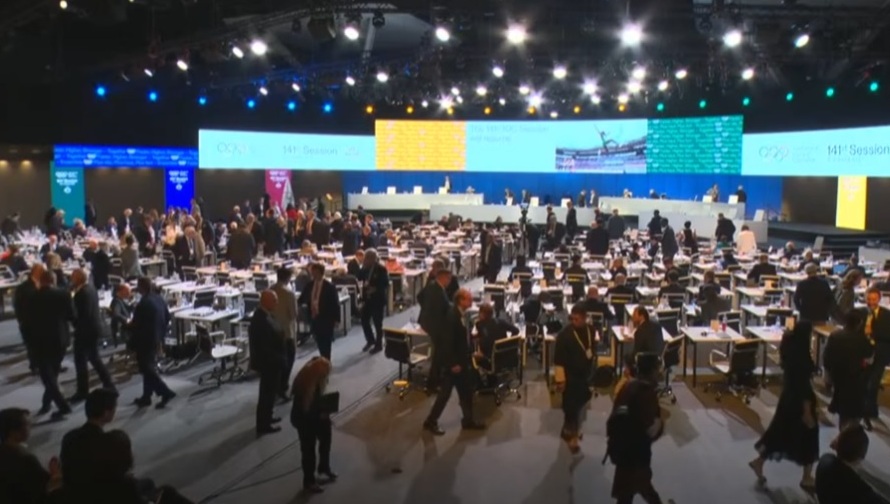
Now 10 years after taking office, Bach has an IOC of his creation. Of the current 107 members, 70 of them elected with Bach as president.
Five for 2028: A Sport Buffet
The biggest story from the Session has to be the addition of five extra sports for the 2028 Games in Los Angeles. Cricket is in, along with lacrosse, squash and American flag football. Baseball/softball, which has been on and off the program for 30 years, is back on. The five sports were the choice of LA 28; all of them are team sports except for squash.
LA 28 chair Casey Wasserman played a major role in selecting the new sports and told the IOC that they represent an opportunity to bring new fans and supporters to the Olympic Movement.
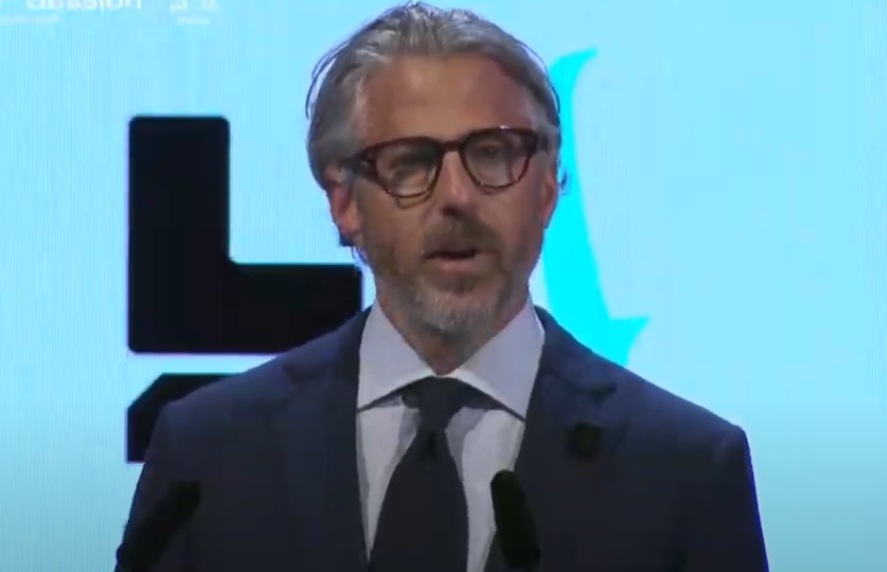
Concerns about cost and size of the added events are an issue as IOC rules limit the Summer Olympics to 10,500 athletes. The new events would push that number above 11,000. Combined with a total of 36 sports, LA 28 would be the biggest-ever Olympics. Organizers say the expanded sports program will be worth it in the long run.
On the cost side, Los Angeles organizers say the additional sports can be accommodated without building new venues. There is room in the Olympic Village for extra residents. The complex of dormitories and apartments at UCLA is ready with space.
Cricket in particular seems to have found its niche in Los Angeles for a return to the Olympics. It appeared once before, at the London 1900 Games. Wasserman is known as a fan of NBA action. But he apparently likes cricket, too. Wasserman paid attention to the sport’s potential when International Cricket Council pitched LA 28 for a one-time shot at the Olympics. Initial estimates say cricket could mean an additional $200 million in rights fees from India, Australia and other countries with a cricket obsession.
When Indian Prime Minister Narendra Modi visited the White House for a state dinner in June, Wasserman was one of the guests, as was Eric Garcetti, mayor of Los Angeles during its Olympic now ambassador to India. Also at the dinner: IOC member Nita Ambani, one of India’s movers and shakers, patron of the just ended Mumbai IOC session and owner of one of the country’s premier professional cricket teams.
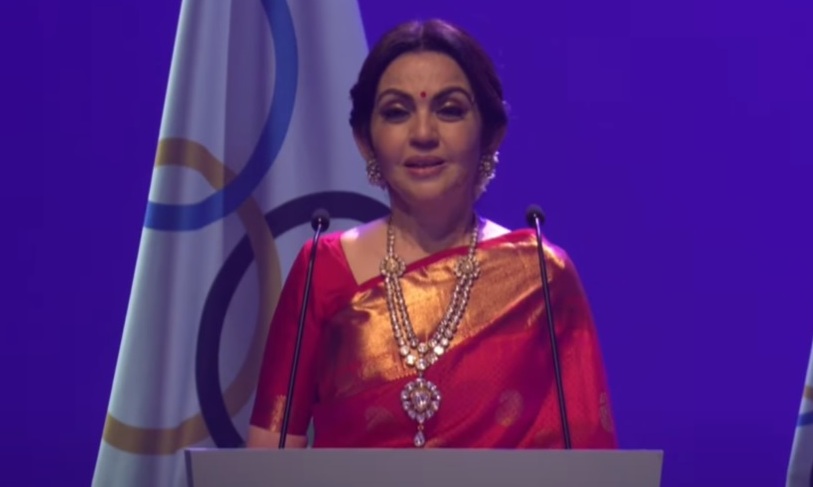
Wasserman and Garcetti both spoke at the IOC session. Wasserman eschewed his customary California business casual attire for a more somber dark suit. It fit the mood of his opening remarks, which briefly acknowledged the attacks by Hamas against Israel that had just occurred. He brimmed with emotion as he denounced violence and anti-Semitism. Wasserman told IOC members that he might not be speaking to them if his ancestors hadn’t been Holocaust survivors.
On the business side of things, Wasserman was accompanied by CEO Cathy Carter in the IOC presentation. USOPC chair Gene Sykes also took a turn. A former Goldman Sachs exec, he was COO of the LA bid that presented to the IOC in 2017 when it was chosen for 2028 and Paris for 2024.
Sykes leads a new team from the USOPC moving forward on the international front. He took office in January. Also at her first IOC Session was Delise O’Meally, named last year as USOPC vp for international relations.
CEO Sarah Hirshland, now in her sixth year at the USOPC, was the veteran of the group. The US team hosted IOC members at a reception one evening in Mumbai, including the two members in the U.S., International Tennis Federation president David Haggerty and Anita DeFrantz, an IOC member for nearly 40 years.
There is discussion behind the scenes about whether to name Sykes as a member well ahead of LA 28. Generally speaking, IOC members are supposed to be limited to two per nation, but that can be as flexible as the IOC president and executive board want it to be.
DeFrantz can serve until 2032 when she turns 80. She is the third most senior of the 107 current members of the IOC. DeFrantz has had some health issues and was greeted warmly by her colleagues as she navigated the session with the help of a scooter chair.
Russia Schism Widens
Two days before the IOC Session, Bach and the EB fired another salvo against Russia for its war against Ukraine by suspending the Russian National Olympic Committee. The move is in retaliation for efforts by the ROC and government to install new NOCs in three regions Russians occupy in eastern Ukraine. The EB says the action is against the Olympic Charter.
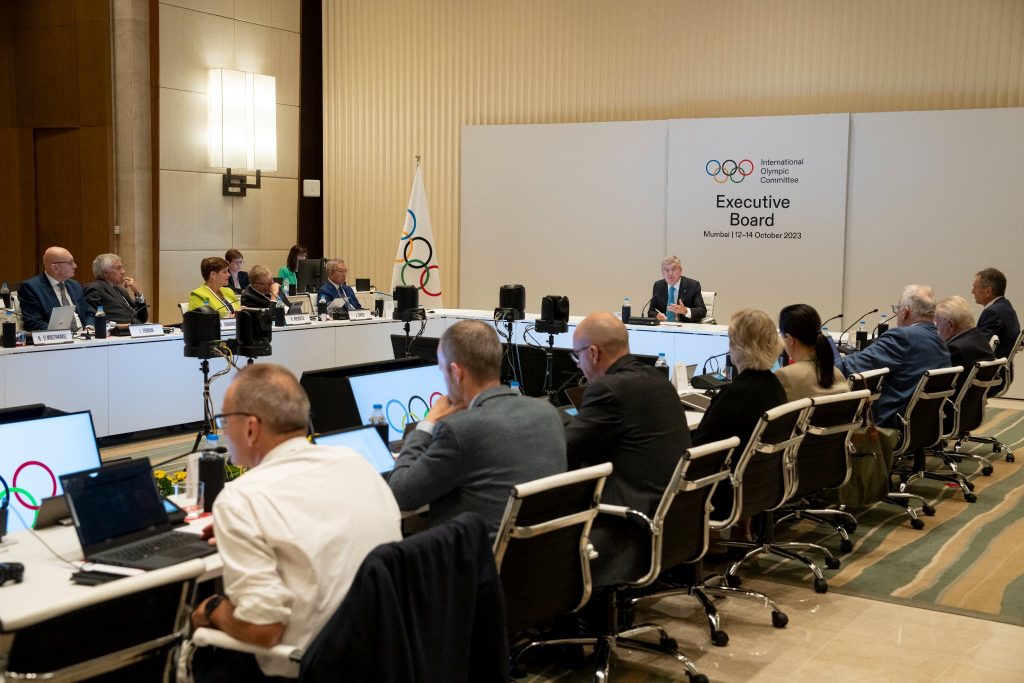
The suspension means no more money from the IOC to Russia for its share of Olympic marketing revenue. That in turn means the Russian Olympic Committee won’t have money from Olympic Solidarity, the IOC fund for athlete support.
The announcement was derided by Russian President Vladimir Putin as racist ethnic discrimination. Putin renewed his call for so-called Friendship Games next year along with other sports events featuring BRIC nations. Putin, whose Olympic Order honorific was withdrawn in 2014, is no longer on speaking terms with the IOC president as he once was.
Neither of the two IOC members in Russia — Yelena Isinbayeva or Shamil Tarpischev — went to Mumbai. No official explanation has been offered for their absence at what would have been a most uncomfortable meeting. Bach took pains to explain that Isinbayeva and Tarpischev are not IOC representatives for Russia, but IOC members in Russia. That distinction of independence is likely an academic one given the current IOC breach with Russia.
Speaking at the same conference where Putin made his remarks, Russian Olympic Committee president Stanislaw Pozdnyakov said he is confident Russian athletes will return to the Olympics in Los Angeles in 2028.
The ROC suspension means Pozdnyakov will not be invited to participate in the annual Olympic Summit hosted by the IOC president at the end of every year. He, along with the president of the U.S. Olympic and Paralympic Committee, are traditionally the NOC leaders who are invited to this high level briefing with major federation leaders and IOC Executive Board members.
For Russia, the fall from IOC grace is dramatic. One of the most important countries in the world for sport, Russia has also been a key player in the world of the Olympics. Russian aspirations to bid for another Olympics are out the window for now. While the IOC believes the suspension of the ROC is necessary, the result is a widening split between them.
Who Will Fix Things?
Repairing the rift between the IOC and Russia may take longer, much longer than Stanislaw Pozdnyakov’s hopes for 2028.
Before there’s any consideration of an official Russian return to the Olympics, there must be a cease-fire and the end of the war against Ukraine. Reparations and rebuilding will be elements of rapprochement, too. Unfortunately, there are few signs that this war will end soon, certainly not by next July when the Paris Olympics begin. If not in 2024, will it be 2025 or 2026 when the war ends?
Given the indeterminate direction the war in Ukraine is taking, it seems unlikely that a cease-fire or rapprochement is possible before Paris, and possibly not for years to come. Two years from now a new IOC president will be in office as Bach is supposed to step down in April 2025. Assuming the worst — that Ukraine is still fighting back the Russian assault — it means the next IOC president starts day one with a difficult task. Either mend the rift or keep it from shattering the world of the Olympics. Experience, good sense and diplomacy of the highest order will be needed from whoever is IOC president.
The philosophy of “all in the same boat” espoused by former IOC President Juan Antonio Samaranch in his quest for unity in the Olympic movement 25 years ago may well be put to the test.
Who better to revive that spirit than the son, Juan Antonio Samaranch Jr.? The businessman from Spain is well acquainted with Russia and has dealt with China through his work leading the IOC commission for the 2022 Winter Games in Beijing. He is one of the four IOC vice presidents.
Sebastian Coe, head of World Athletics, may be an IOC backbencher, but he is a two-time Olympic champion and led the 2012 London organizing committee. Coe has been dealing with Russia ever since he took office at the federation seven years ago just as the Russian doping scandal exploded. None of the possible contenders for president bring a resume comparable to his. Coe is believed to be developing a strategy to win the IOC post. So far he is the only IOC member to publicly express interest in the presidency.
Kirsty Coventry won seven Olympic swimming medals and is now a minister in the government of Zimbabwe. She has been chair of the Athletes Commission and heads the commission for the 2026 YOG in Senegal. She was elected to a seat on the EB at the Mumbai session; EB membership has been held by every one of the prior presidents.
Nicole Hoevertsz is a ranking government official in Aruba. Currently she is one of the IOC vice presidents and chair of the coordination commission for LA 28. She competed in synchronized swimming.
The IOC president said in a press conference last week that politicking for his job is inappropriate until after the Paris Olympics and Paralympics. As a matter of protocol, campaigning for the IOC presidency is supposed to be restrained and not waged publicly. Coe’s expression of interest in the post was in response to a reporter question at the World Championships some months ago. Neither he nor any of the other possible contenders are known to have launched any formal campaign activities.
But it might be noted that race for the IOC presidency began moments after the open of the Mumbai Session. Just as Bach launched the meeting, he recognized Mustapha Berraf of Algeria and Luis Mejia of Dominican Republic for comments. Both are two of the IOC’s more voluble members. Both heaped praise on Bach’s work, begging him to stay on four more years.
A seemingly surprised Bach thanked them for their bon mots, but insisted the Olympic Charter is something he honored. The governing document for the IOC sets 12 years as the term limit for a president. He called upon IOC vp and legal expert John Coates to explain the difficulty and timing required for a change in the charter. Coates said any change proposal needs 30 days notice prior to the Session when it will come for a vote. A two-thirds vote of the Session is then required.
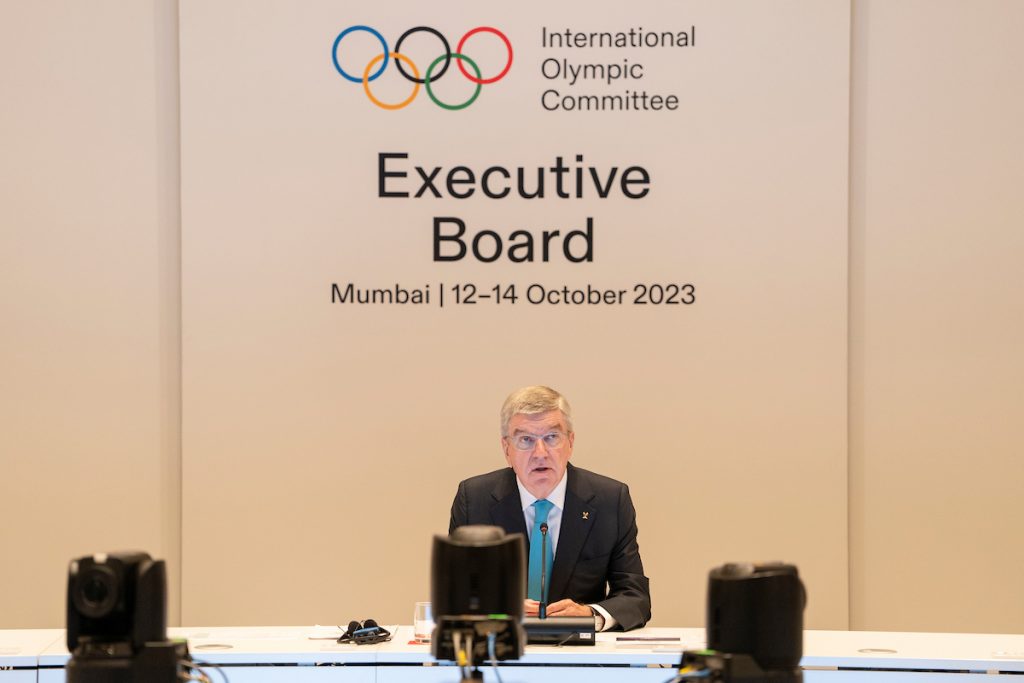
But the real cruncher for a charter change would come from the EB chaired by Bach. The 15-member board must approve such proposals before the final draft heads to the Session for ratification. That would need to happen soon to have any chance of success at the 2024 Paris Session. With EB meetings in December and early 2024, there are not many chances left to take action. And with three EB members as possible contenders to succeed him, it would take some nerve on Bach’s part to even broach such a proposal for consideration by the EB, especially with him to benefit.
In his closing press conference, Bach did not categorically rule out the possibility that he would remain in office. He insisted that there is a reason the IOC has term limits for the president. The limit was a key IOC reform adopted 20 years ago in the wake of the Salt Lake City vote buying scandal the 2002 Games.
By rejecting the acclaim from his colleagues to pursue four more years, Bach demonstrates he is a man of his word. Or like a relay runner, ready to pass the baton onto a fresh pair of legs.
